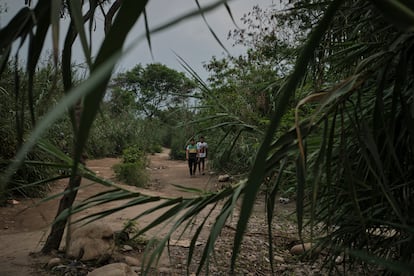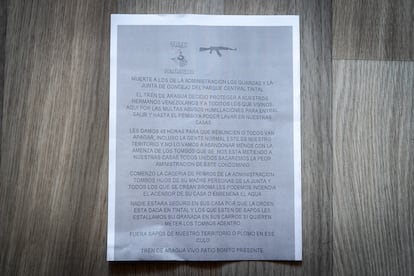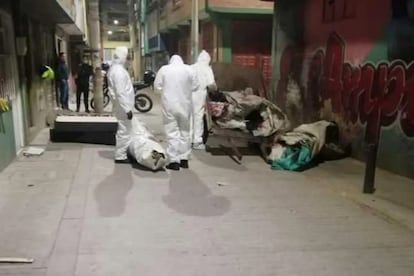Tren de Aragua, the Venezuelan criminal gang spreading terror from Chile to Colombia
The organization, which is involved in crimes such as human trafficking, sexual exploitation and drug trafficking, is extending its tentacles in eight countries in the region


In Lima, the capital of Peru, a trans woman was shot 31 times last March. The killer recorded the murder and shared it on social media. In northern Chile, in the city of Arica, two bodies were exhumed last month. Both were found to have been buried alive. In May, Colombia’s Attorney General’s Office confirmed that a bar in Bogotá had been used to dismember people. Behind these atrocities is the Tren de Aragua (Aragua Train), an organization that began as a construction union for an unfinished construction site in Venezuela back in 2009. Fifteen years later, it has extended its tentacles to eight countries in Latin America: Venezuela, Chile, Ecuador, Colombia, Peru, Bolivia, Brazil and Panama.
For several years, Venezuelan journalist Ronna Rísquez has been tracking the criminal organization and learning about its structure and singularities. Three months ago, she published a book about what she discovered called El Tren de Aragua. La banda que revolucionó el crimen organizado en América Latina (or, Tren de Agua. The gang that revolutionized organized crime in Latin America).

According to Rísquez’s findings, the transnational mega-gang has a “portfolio of crimes.” “Some are the traditional crimes you find in a criminal organization, such as extortion, contract killings and drug trafficking,” she explains. “While others are not so common, such as their involvement in sports activities, more precisely in the deals of Venezuelan baseball players who sign for major league clubs in the United States. Investigations indicate that they are shadow partners in several training academies, and that they charge a large percentage for each contract.”
Of their criminal activities, human trafficking and sexual exploitation are the most profitable. In Lima alone, it is estimated that they make around one million soles (around $275,000) a month from 10 prostitution rings. According to the Peruvian Police, the gang gained control over these rings through brutal violence, pushing out the pimps, who, in most cases, did not pose much of a threat.
“They realized that the way to survive was to look for ways to make money in other countries, because Venezuela was broke. One of the Tren de Aragua’s skills is being able to quickly identify what we could call criminal business opportunities. When countries began to put restrictions on Venezuelan migration, it was clear that the population was not going to stop leaving. What did they do? Guide migrants through irregular routes like the coyotes in Mexico. By controlling the trochas [informal roads], they also controlled the illicit merchandise,” explains Rísquez, who prefers not to give details of her current whereabouts.
Part of the profits made by the Tren de Aragua goes to the Aragua Penitentiary Center, better known as the Tocorón prison. That fortress, which was built 40 years ago, is home to the leader and founder of the organization: Hector Rusthenford Guerrero Flores, alias Niño Guerrero, who was sentenced in 2018 to 17 years in prison for a string of crimes. All members of the gang are accountable to him.

“I’ve estimated they collect $15 million a year, but that’s a conservative estimate. It has to be much more than that,” says Rísquez, who went to Tocorón prison many times, but was only able to enter once. It was a key part of finishing her book. There, she verified what had been an open secret for years: that the prisoners have taken over the jail and turned it into luxury suites. She saw swimming pools, sports courts, restaurants, clubs and even a zoo.
“It has the same layout as a zoo, only smaller. The animals are in cages adapted according to their species and I found monkeys, an infinity of birds, ostriches and even a lynx. It is incredible. Behind the gate, I did not see prison officials, but armed prisoners who acted as guards,” she says. Rísquez had to enter without a cellphone or a notebook. The slightest misstep could have been fatal.
The journalist says the brutality of the Tren de Aragua is above all a strategy to intimidate their adversaries. “It is their way of gaining the respect of the others and showing them what they are capable of. They can do terrible things like dismember someone and leave them in a bag. But they tend to avoid armed confrontations with other gangs. They are more about leaving messages,” she says.

Colonel Ricardo Espinoza, the chief of the Human Trafficking and Migrant Smuggling division of the Peruvian National Police, says that the gang charges Venezuelan migrants between $4,000 and $5,000 to guide them to Peru — money that is impossible for them to pay back. What’s more, the gang members set very high interest rates that must be paid weekly or even daily, and threaten to kill the migrants if they don’t pay up. That is why the women, including many minors, end up trapped in prostitution and living in so-called “safe houses.”
According to Colonel Espinoza, there are a number of jobs linked to sexual exploitation that provide gang members with a fixed income. “They put you on the payroll. The first level is to provide security for the prostitution ring. In other words, to ensure that clients do not exceed their time or mistreat the girls. They can receive up to $400 a week. Then there are the men who mobilize the women, those who guard the safe houses, and at the top the hitmen,” he explains.

General Carlos Alberto Malaver, the director of the Human Trafficking and Migrant Smuggling division, says that the Tren de Aragua is also taking over the small-time loans business in Peru, which was formerly dominated by Colombian criminal organizations. “Wherever there is a shopping mall, a market or a group of bars or restaurants, they are there. They lend money to humble people like vendors or motorcycle taxi drivers, who end up paying with their lives. They are an organization that dynamically feeds off power. But we are having an effect,” he says.
Unlike other gangs, the bosses of the Tren de Aragua are not ostentatious and instead use low-profile jobs as a front. One day they may be cab drivers and another a cleaner, says Ronna Rísquez, who wants her work “to be understood not only as the story of a criminal organization, but also as the story of a country imprisoned by violence and state neglect,” in reference to Venezuela. She has the same fear as the authorities: that the gang will spread its tentacles even further.
Sign up for our weekly newsletter to get more English-language news coverage from EL PAÍS USA Edition
Tu suscripción se está usando en otro dispositivo
¿Quieres añadir otro usuario a tu suscripción?
Si continúas leyendo en este dispositivo, no se podrá leer en el otro.
FlechaTu suscripción se está usando en otro dispositivo y solo puedes acceder a EL PAÍS desde un dispositivo a la vez.
Si quieres compartir tu cuenta, cambia tu suscripción a la modalidad Premium, así podrás añadir otro usuario. Cada uno accederá con su propia cuenta de email, lo que os permitirá personalizar vuestra experiencia en EL PAÍS.
¿Tienes una suscripción de empresa? Accede aquí para contratar más cuentas.
En el caso de no saber quién está usando tu cuenta, te recomendamos cambiar tu contraseña aquí.
Si decides continuar compartiendo tu cuenta, este mensaje se mostrará en tu dispositivo y en el de la otra persona que está usando tu cuenta de forma indefinida, afectando a tu experiencia de lectura. Puedes consultar aquí los términos y condiciones de la suscripción digital.








































